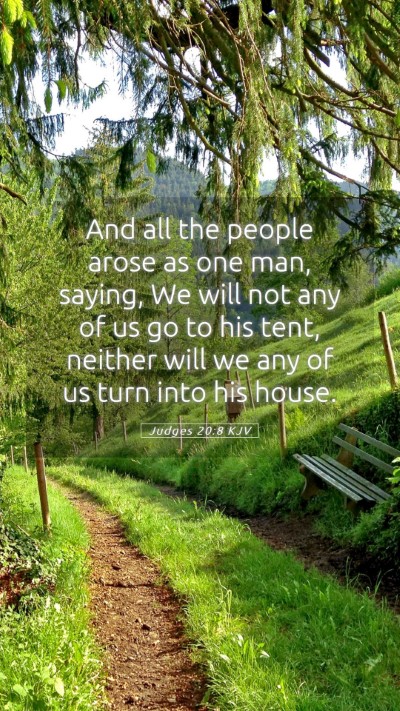Understanding Judges 20:8: A Comprehensive Analysis
Judges 20:8: "And all the people arose as one man, saying, We will not any of us go to his tent, neither will we any of us turn into his house."
Meaning and Context of Judges 20:8
This verse takes place in the context of a grave situation in Israel's history, where the tribe of Benjamin faces serious repercussions due to the heinous crime committed in Gibeah. The entire nation of Israel gathers in response, indicating unity and collective decision-making in dire circumstances.
Bible Verse Explanations from Commentaries
-
Matthew Henry:
Henry reflects on the unity displayed by the Israelites, underscoring the seriousness of the crime committed and the urgent need for justice. The phrase "arose as one man" illustrates their collective resolve, highlighting the importance of communal action in the face of moral failure. Henry emphasizes that the Israelites were moved by a sense of righteousness, illustrating how communal sin can prompt a collective response.
-
Albert Barnes:
Barnes elaborates on the implications of the decision made by the Israelites, noting that their refusal to return to their homes signifies a profound commitment to rectify the wrongs within their community. He points out that their action reflects a strong covenant community ethos, where individual comforts are set aside for the broader good of society. This reflects a biblical principle that emphasizes accountability and the pursuit of justice.
-
Adam Clarke:
Clarke interprets the verse as a moment of crisis and moral outrage among the tribes of Israel. He notes that this was not merely an act of rebellion but rather a critical gathering of the Israelites to confront a dire situation. Clarke suggests that this response reveals the depth of their commitment to justice and their unwillingness to accept egregious acts within their society. He highlights how this decision sets a precedent for later communal decisions in Israel's history.
Key Themes and Insights
This verse and its context serve to deliver several key themes essential for understanding biblical narratives and their implications:
- Unity in Crisis: The coming together of the tribes symbolizes the strength and importance of unity, especially when addressing communal sin and injustice.
- Collective Responsibility: This verse showcases the shared responsibility within the community for upholding justice, reminding us of our roles as members of a larger society.
- Importance of Justice: The actions of the Israelites reflect a strong biblical mandate for justice, deeply rooted in the character of God as just and holy.
Application of Judges 20:8 to Modern Life
Understanding Judges 20:8 helps us grasp how biblical narratives can apply to our contemporary lives. Here are a few applications:
- Gathering for Common Causes: Just as the Israelites came together to address injustice, we too are called to unite against social injustices in today’s world.
- Prioritizing Community Over Individualism: This verse challenges us to consider the needs of our community and society over individual comfort, fostering a sense of collective purpose.
- Responding to Moral Failures: It urges individuals and communities to confront and address moral issues, encouraging proactive responses towards wrongdoing.
Related Bible Cross References
- Judges 19: The context of the crime committed in Gibeah.
- Deuteronomy 13:12-16: Instructions regarding how to deal with evil in the land.
- 1 Corinthians 5:6-7: The New Testament's teaching on dealing with sin in the church.
- Galatians 6:1: The importance of restoring those caught in sin.
- Acts 2:44-47: The unity of the early church which mirrors the unity of Israel.
Conclusion
Judges 20:8 stands as a powerful reminder of the importance of unity, collective justice, and moral responsibility within a community. Through the lens of biblical commentaries, we gain deeper insights into its implications, making it a relevant scripture for audiences seeking understanding and application in both historical and contemporary contexts.


